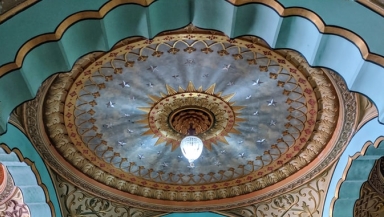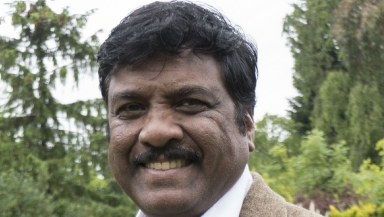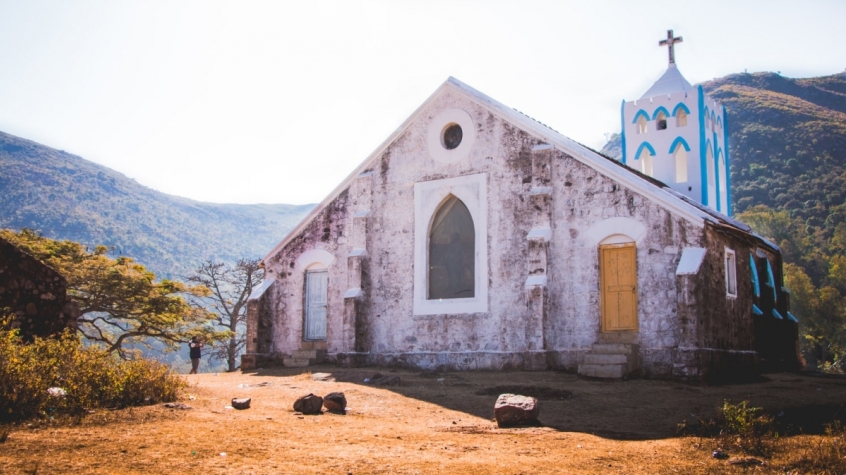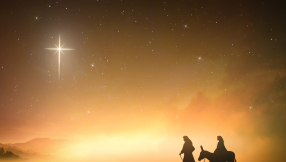
A new report has warned of increasing attacks on Christians in India, much of it at the hands of Hindu nationalists. Kumar Swamy, National General Secretary of the All-India Christian Council, described more of the situation in a recent interview with Release International, an organisation supporting persecuted Christians worldwide.
Why is there hostility towards Christians in India?
Kumar: First of all, there is a kind of ongoing revival, if I can use the word, among the Hindu community. The BJP is making extra efforts to, unfortunately, paint a picture against the minorities, like Christians and Muslims, that we are anti-nationalist. And unfortunately many of the general public probably has bought those concepts, and that probably has gone against minorities in the country.
What you're describing is a rise of nationalism in India. We understand that there is a philosophy called Hindutva, which is to say that if you are an Indian you need to be a Hindu. The two go hand-in-hand. Is that kind of thing partly to blame, partly the reason for this change, this increased majority?
Kumar: That's absolutely right. The nationalism and the Hindutva, the Hinduism, these are at this point going hand-in-hand. That has definitely contributed to this scenario.
So why would they see Christians as being not true Indians or not true nationalists?
Kumar: Primarily because they think first of all these good old notions that Christianity is a foreign religion, thanks to the British rule when they were there. So the typical average Hindu sees Christianity as a western religion; it is a British religion, it is an American religion; Jesus is a western God. This is a totally false notion or concept, as we all know. So we have a long way to go to clarify that notion, actually.
Now most of us would have seen the film Slumdog Millionaire. In that film we see a very powerful depiction of Hindu nationalists attacking Muslims, in that case. Frightening move, but is that the same kind of thing that is happening to Christians in India?
Kumar: Very much so. That's a good comparison and parallel with Slumdog Millionaire. I have seen the movie myself and it talks about how the atrocities are unleashed against the minorities, particularly the lower caste, the Dalits, especially. I come from a Dalit background myself. So this is an ongoing attack on the Dalits, thanks to the caste system, which encourages them to do it [...] and so we need a lot of grace and wisdom to tackle this major issue, not only as minorities, as the Christian community, but also as the Dalits, I feel.
We will return to that issue of the Dalits particularly being persecuted later, because it's key to this whole issue. But can you describe what many are seeing as an increase in persecution in India? Is that an accurate picture – an increase in the number of attacks against Christians?
Kumar: That is certainly an accurate picture. There is an increased, accelerated, escalating violence against the Christian community and as a Christian, as a Dalit Christian, I would primarily argue that the reason for that is because of the numbers of Dalits en masse coming to the Christian faith.
I have seen it myself, as I have gone through it myself as a Dalit, embracing Christianity, because it is only the gospel, Christianity, which gives the value for human beings. There is dignity in the gospel and that's what every Dalit longs to hear. He wants to be treated as a human being.
But when a Dalit hears that he or she is created in the image of God, as I have heard in my life, that immediately helps him to grasp or grab the gospel, so to say, because there is a God who treats them equally. There is a God who declares that they are created in His image, and that's how Dalits are coming to Jesus Christ in a big number now.
Many of us may be unfamiliar with the Dalits and their situation. They're also known as the Untouchables or the Outcasts, In other words, as people who are not within the Hindu caste. And at some levels, the Dalits may also be taught that they are not full human beings. Now that was your experience, too, wasn't it?
Kumar: I can think of my own story in my childhood, like I constantly used to hear my mother saying we are Untouchables – subhuman is the word she used, I vividly remember – that we are not human beings. And that's how I grew up, constantly hearing from my own mother telling me that I am a subhuman, I am not a real human being.
I remember it came home very strongly when I was playing cricket with some of my friends. There was a boy who belonged to the upper caste, the Brahmin community. I accidentally bumped into him and he became very angry and he yelled at me saying, "You dirty Dalit dog!"
So when I heard those derogatory terms, I had a cricket bat in my hand. I took it and hit him hard. He got hurt, he was bleeding. That became big news in the village, talk of the town, so to say. And they all, 30 or 40 of them descended on the scene, all his friends and relatives. They held me guilty of committing this unpardonable sin, as they called it. They said I deserved the punishment. In the next 24 hours we had to pack our stuff and relocate somewhere else.
So the entire family to move out of the village because of a squabble between kids?

Kumar: Absolutely right. My parents were shattered. There were shocked, they were in tears as this punishment had been awarded to us. But we had to do what we were told to do otherwise they would probably have hurt us, harmed us, even killed us, because that goes on every day in our country, even today. So we had to do what we were told, so we relocated ourselves to another Dalit village.
So in terms of the position of Dalits in society, you can see why, coming from that background of being taught that you are worthless and subhuman, that the gospel message would be a message of liberation.
Kumar: Absolutely right. But because of the gospel, I believe that there is hope for the Dalit community, and we are talking about at least 250 million Dalits in our country today, who are viewed as subhuman, who are treated as lesser than animals – 250 million of them – almost five times the population of the United Kingdom.
So now there is hope for this community, because the gospel is there, as I have seen it, I have received it, I have accepted it. The gospel is the answer to the problems of the Dalits. Hence I believe as we continue to share this gospel, [it] has the power to liberate, [..] to give dignity, hope and true liberty.
And I'm praying that the gospel of Jesus Christ will continue to have its impact, its influence, and I'm coming to spread it so that the Dalits of India will have hope and it will be a new India. That's what our hope is as the gospel is changing the lives of people and transforming communities of India today.
Fifteen years ago roughly we had no single church - our organization that I currently represent, called Good Shepherd Church of India. That was 15 years ago – no single church. But today, by God's grace, we have over 4,000 churches across the land of India. And every week, two or three new churches are born. And it's primarily because the Dalits are coming to Jesus Christ in a big number. And that's what God is doing and that will happen.
Now, the backlash against this means that there have been attacks on those who are sharing their faith and those who are coming to faith. And there have been moves to change the law to bring anti-conversion laws into force. How many states have now passed anti-conversion laws?
Kumar: At least seven states of India that currently have anti-conversion laws in place. And I know there are at least one or two more states that are seriously discussing it.
But one thing is very clear, that the political party that has been re-elected to power, the BJP, has definitely an agenda to bring the anti-conversion law across the nation. One or two top influential ministers are going to push it, force it, so we are really concerned about it.
If that comes into place it is going to be very, very tough for the Christian community. I have been to some of the states where the anti-conversion law is in place. I have seen personally, physically the copy of it, actually, which says if I want to share the gospel with somebody, I need to go to the local magistrate, the authority, and report to him that I want to share the gospel with such and such a person, two months, three months ahead of time! If I fail to do it, I'll be penalised with two years of imprisonment, and maybe a £400 fine I have to pay.
This is a draconian law. This is absolutely unacceptable, because India being the largest democracy in the world is acting otherwise, going against the freedom of religion, which the constitution has promised us. So we have a long battle and a big challenge as a Christian community. We are highlighting it and we are going to seek recourse and appeal for protection, for security for the churches and for the protection of the Christian community in general in the country.
And we'll promise our solidarity, that we as a Christian community will stand with them and pray for them that God will give them the wisdom, the compassion, so that our country will be a peaceful country with communal harmony. That's our prayer.
Currently, the constitution guarantees freedom of religion, and there have seen suggestions that the constitution itself could be changed, so that instead of India being a secular nation, as guaranteed under the constitution, it would become a Hindu nation. How likely is that?
Kumar: Even the non-Christian secular people, the minorities, the gentle Hindus who are secular in their views are taken by shock as this discussion is going on that they will change the constitution, and that is going to be a really, really sad event if that does happen. We are praying that will not happen.

But there will be a strong, stiff opposition to the move, which is not going to be healthy for a secular nation like India. We will be praying that that will not happen. We will do our best as minorities, as a Christian community, that it will not happen. Above all, we need to pray that God will not allow that to happen.
So that is a call for you and Christians in India to pray. What about politicians in the West? What can our governments do? What do you feel our governments should be doing to help you?
Kumar: The government here in the UK and other Christian nations across the world, like America and so, on have a very important role to play, we believe as the Christian community in the country. Because a global, united voice can make a big impact in the land of India.
Our Prime Minister will definitely take notice if there is a note from, say, the UK, the Prime Minister here, or the parliament here. We have made some efforts to bring this to the notice of the parliament here. We have met Members of Parliament in the UK to enlighten them, and they are aware of it.
I do know and I hope that there are some changes taking place in your country here. I hope that the UK Parliament will make a place to address this heinous crime, which is a gross human rights violation. It is a violation of human rights and freedom of religion. And I hope that the UK government, the parliament, will take note of it and address it and our Prime Minister will take notice and probably, God willing things may change.
Now in all of this, there is some good news, because you have said the church is growing despite the persecution, despite the increasing pressure. There may be a chill wind blowing across India, but actually the church is coming alive. Can you describe that?
Kumar: Absolutely! As it says in the Scripture, persecution is not new to us in a way, because when the gospel came to India 2,000 years ago, tradition says the apostle Thomas brought the gospel to our country, and that's our rich heritage all right, but he was martyred by the radical Hindus then. In fact, I have gone to St Thomas' Mountain in the city of Chennai many times and spent some time in the very place where tradition says that the apostle Thomas was killed in a little cave when he was praying. I have spent many a time praying there.
Our prayer is that in spite of the persecution, the Church of Jesus Christ in India will stand firm, stand strong, stay strong on the word, on the promises of God and continue to witness and not fear and not be intimidated, and continue to be courageous, to stand firm, as this is what our calling is as Indian Christians. In the midst of persecution, the church is growing and exploding in our nation as never before!
Now there's a price to be paid for that. You've paid the price yourself. You've described the first attack on you when you were 11. But you have been attacked since then, persecuted for your faith and for sharing your faith – what is it that keeps you going? Where do you get your strength and your determination?
Kumar: Thank you. Yes, I remember one particular incident around 20 years ago. I remember going into a particular town which was known as a strong, resistant area for the gospel by the Hindu fundamentalists.
I remember going there and I was preaching, along with my colleagues. There are around five or six of them standing there, sharing the gospel. Suddenly a group of masked young people, around 20 or 30 of them, just came there and started attacking us, pelting stones at us. With some sticks, they just hit us. I remember, we literally just ran from that place, bleeding, our shirts soaked with blood.

That was 20 years ago. But today, in that very same place, we have at least 15 or 16 churches planted. So this is what God is doing in India. This is the biggest encouragement for me as a Christian. I am really blessed and boosted up, encouraged and empowered as I see people coming to Christ in the midst of persecution. In the midst of attack, the church is growing. So that's the biggest encouragement for me, and that's my basic motivation to just press on with Jesus in the midst of persecution.
Why do you love Jesus so much?
Kumar: I love Jesus so much because he loved me first! And he gave his very precious life, and that's the difference between Jesus and the other gods of other religions. Hinduism says there are 330 million gods, but none of these gods ever died for a sinner like me. It was only Jesus. And it is he who gives me the hope; it is he who created me in his image. I was told I was created less than an animal, but Jesus says, 'No, I created you in my image.' That's why I love Jesus!
Andrew: So if you could meet your Prime Minister, Narendra Modi now, which of course you actually want to do, what would you say to him?
Kumar: My request would be to assure him that as a Christian community we are not against him. We want to assure him of our prayers, our support, that we will stand with him and we will pray for him. But I also will equally give him a plea, a request that he will ensure the safety of the Christians in this country, because [...] we have seen how his government can turn a blind eye when the atrocities and persecution are unleashed against the church.
How is Release helping you in India in these practical situations?
Kumar: We are thankful to God for Release International and their partnership, which is huge. It is a very precious partnership, which we do not want to take for granted, because they are coming to stand with us, not just praying with us, but also practically helping. Number one, in training our pastors. Some of the Release leaders have come to train our pastors in India.
They have financially helped us to help the persecuted church in the areas of legal battles, because sometimes they go on for years, actually, so they give financial help in helping our pastors legally. As soon as the attack takes place, medical help is also another big area where Release is coming along and helping pastors to medically take care. We thank God for Release International and their partnership, and we would like to see this partnership going on to bless the persecuted church in India.













